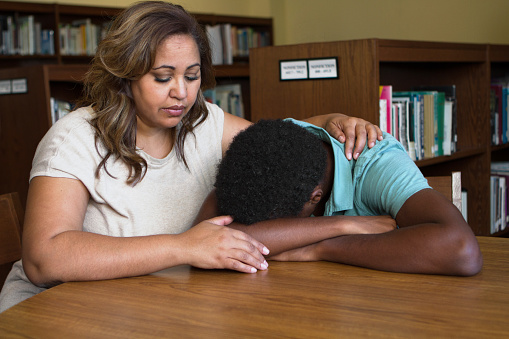We can probably all agree that life as a child has gotten more difficult. The need to post pictures on social media, look a certain way, or get good grades has caused our kids to struggle with stress.
As many as one in five children suffers from clinical depression. Depression is more than sadness. It is a persistent feeling of hopelessness. It can last for prolonged periods and requires action to help a child who suffers with it. Symptoms are excessive sleeping, insomnia, overeating, appetite loss, aches, pains, irritability, emptiness, loss of interest in previously enjoyed activities, and suicidal thoughts.
If your child has depression, here are a few suggestions for how to help them:
- Tell them you care
Let them know that you are here for them. Be consistent. Your loving presence is powerful.
- Don’t minimize their feelings
Their feelings may be the only thing they have control over. Support them where they are at, not where you want them to be.
- Don’t compare their feelings to those of others
No two people with depression are alike. Your child wants to be heard, accepted, and loved.
- Ask how you can help
Reduce their burdens by doing simple tasks for them. It may not seem like much, but your effort to help shows you care.
- Seek help from a medical professional
Children with depression sometimes need more help than parents can supply. Saddleback Church has an extensive list of licensed therapists to help your child if necessary.
Caring for a child with depression can be stressful. Self-care habits are important for you and your family.
Here are some suggestions:
- Slow the pace of your life
Make the choice to slow down and focus on your relationship with God and your family.
- Practice gratitude
Each day, journal a few things you are grateful for. Thank God for his blessings.
- Sleep
Everyone benefits from a good night’s sleep.
- Exercise
Physical activity increases relaxation and decreases stress.
- Healthy nutrition
A healthy diet helps calm a stressed mind.
- Drink water
Our brains are 80% water. Dehydration affects our thoughts.
- Listen to music
Music activates most regions of the brain. Add some dancing. Make it fun.
Children learn what they live. If you feel you are struggling, the best you can offer your child is to seek support for yourself. Celebrate Recovery offers help for hurts, habits, and hang-ups. There are also groups for children and adolescents. You can attend Celebrate Recovery at Saddleback Church or find one by accessing this link: https://locator.crgroups.info.
A prayer for you and your child:
“Lord, I know you love my depressed child. Isaiah 41:10 says, “Fear not…I will strengthen you; I will help you; I will uphold you with my righteous right hand”. You know my child’s thoughts and feelings before they even have them. You know the distress in their heart and mind. Please help me, Lord, as I travel this road with them. Help me with my struggles. Thank you for loving us unconditionally and always being here for us. We belong to you, and we thank you for meeting us right where we are at. In Jesus name, Amen”.
If you would like to hear more about this topic, CLICK HERE
Author
-

Amy Kendall was the Next Gen Disabilities and Mental Health Pastor at Saddleback Church and was on staff from 2007-2024. Before working at Saddleback, she worked for 10 years in the educational sector as a behavior specialist, specializing with children on the autism spectrum. Amy graduated from Pacific Christian College with her BA in Ministry and from Hope International University with her MA in Marriage, Family, Child Counseling. Amy was recently on the board of the Disability Ministry Conference as their vice president and speaks often in regards to disability ministry. Amy also has a teenage son with multiple disabilities and mental health struggles, and she believes that she is a better pastor because she gets the blessing to be his mom.
View all posts






